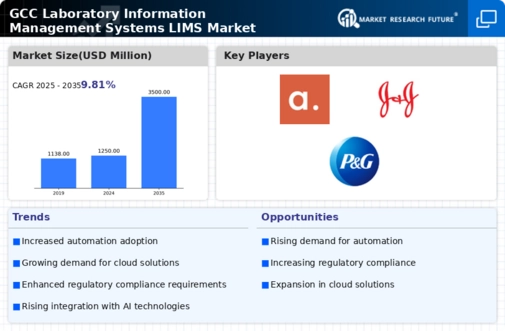Focus on Enhanced Data Security Measures
In an era where data breaches are increasingly prevalent, the focus on enhanced data security measures is becoming a critical driver in the GCC laboratory information management systems market. Laboratories handle sensitive data that must be protected from unauthorized access and cyber threats. As a result, there is a growing demand for LIMS that incorporate advanced security features, such as encryption and user authentication. The GCC region has seen a 40% increase in cybersecurity investments within laboratories, reflecting the urgent need for secure data management solutions. This emphasis on data security not only safeguards laboratory information but also ensures compliance with regulatory requirements, thereby propelling the growth of the laboratory information management systems market.
Emphasis on Quality Control and Assurance
Quality control and assurance remain critical components within the GCC laboratory information management systems market. Laboratories are increasingly mandated to adhere to stringent quality standards, which necessitate the implementation of comprehensive LIMS. These systems facilitate the monitoring of processes, ensuring that all laboratory activities meet established quality benchmarks. The GCC region has witnessed a rise in regulatory frameworks that emphasize quality assurance, leading to a projected increase in LIMS adoption by 20% over the next five years. This focus on quality not only enhances laboratory credibility but also fosters trust among stakeholders, thereby driving the demand for advanced laboratory information management systems.
Growing Demand for Data Management Solutions
The GCC laboratory information management systems market is experiencing a notable surge in demand for efficient data management solutions. Laboratories are increasingly recognizing the necessity of robust systems to handle vast amounts of data generated from various experiments and analyses. This trend is driven by the need for improved accuracy, traceability, and compliance with regulatory standards. According to recent statistics, the GCC region has seen a 15% annual growth in laboratory data generation, necessitating advanced LIMS to streamline operations. As laboratories strive to enhance their operational efficiency, the adoption of sophisticated data management solutions becomes paramount, thereby propelling the growth of the GCC laboratory information management systems market.
Rising Investment in Research and Development
Investment in research and development (R&D) is a pivotal driver for the GCC laboratory information management systems market. Governments and private entities in the GCC region are allocating substantial resources towards R&D initiatives, particularly in sectors such as healthcare and pharmaceuticals. This increased investment is fostering the establishment of new laboratories, which in turn drives the demand for sophisticated LIMS to manage research data effectively. Recent reports suggest that R&D spending in the GCC is projected to grow by 30% over the next five years, indicating a robust market for laboratory information management systems that can cater to the evolving needs of research facilities.
Integration of Automation in Laboratory Processes
The integration of automation technologies within laboratory processes is significantly influencing the GCC laboratory information management systems market. Automation enhances operational efficiency by minimizing human error and expediting data processing. As laboratories increasingly adopt automated systems, the demand for LIMS that can seamlessly integrate with these technologies is on the rise. Recent market analyses indicate that the automation sector within laboratories in the GCC is expected to grow by 25% in the coming years. This trend underscores the necessity for advanced laboratory information management systems that can support automated workflows, thereby enhancing productivity and accuracy in laboratory operations.













